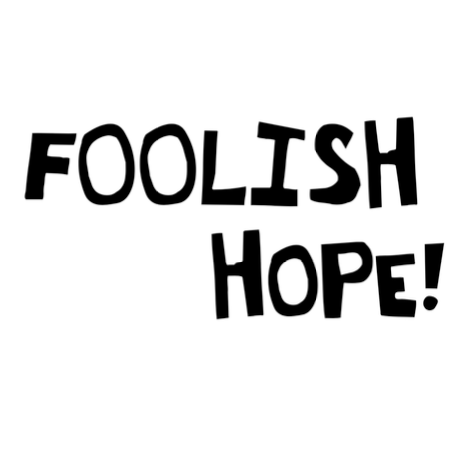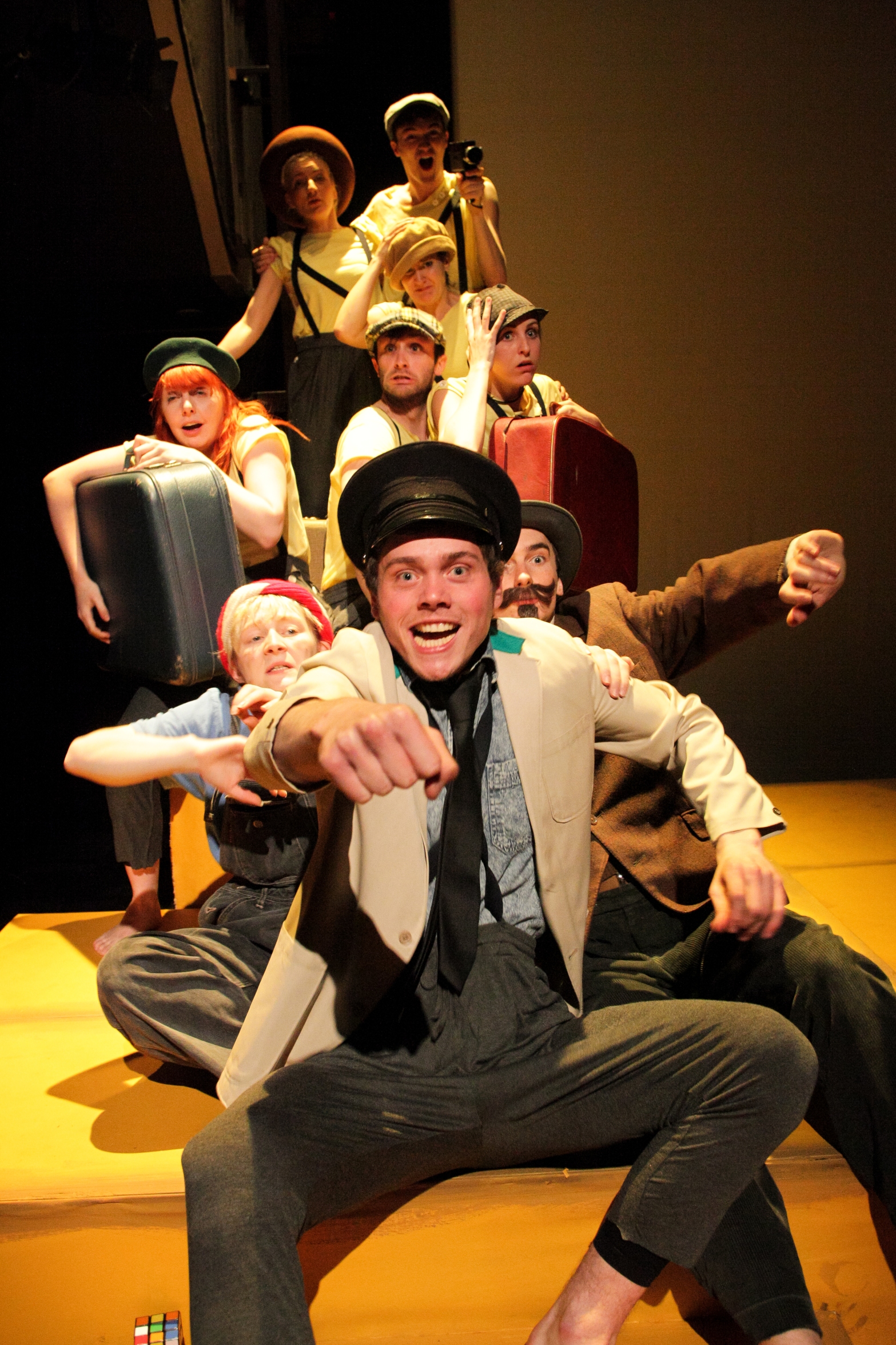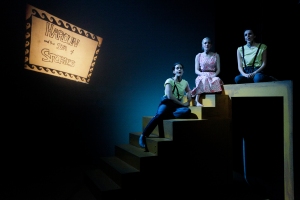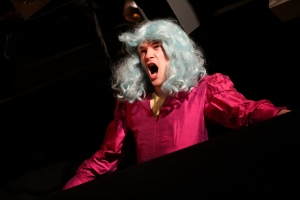I just finished directing Haroun and the Sea of Stories for East 15’s Physical Theatre course. Here are a few of the things I learnt…
– The bigger the challenge, the more I grow
Haroun and the Sea of Stories is one of the most complicated plays I know – it’s got a split narrative and huge action sequences – for example Haroun flies through space, swims deep underwater, battles shadow-warriors, discovers a magical ‘Sea of Stories’, escapes from a huge melting ship etc etc. It’s a divine story, and I knew it would be ideal for the students on East 15’s Physical Theatre course. Ultimately though, I wanted to direct it because of the enormous personal challenge: I had no idea how to stage it; I wasn’t even sure I could. Testing myself and the cast was hard work, stressful and often unpleasant. But we succeeded, often beautifully, and both the cast and myself grew hugely as a result.
– I could have been a lot better prepared I’m never sure what the ‘right’ level of preparation is, because I think it’s crucial that a cast has full ownership over what they’re performing. I’m also much keener on discoveries made in the rehearsal room than those intellectually cooked up at home. But by delaying design decisions until mid-way through rehearsals, there were knock-on effects elsewhere, and I was playing catch up throughout. I’m not saying that all decisions should be made before rehearsals start, but I do think there are some things – like my personal responses to the play and its dramaturgical structure – that I could have explored much more in advance. The sad fact is that preparation time is a luxury, and directors just aren’t paid enough at the moment to have it…
– I’m best when I provoke and then get out of the way I used to think the director’s job was to solve every creative question. Unfortunately though, I don’t think I’ve got a great visual imagination, I’m not that funny, I’m not a particularly good writer, I’m a pretty mediocre actor, and I suck at staging big physical numbers. In other words, I’m probably the least talented person in the rehearsal room. What I learnt from directing Haroun is that it’s much better to set the right provocations and then get out of the way. I had an amazingly inventive cast who, when left alone, came up with much better ideas than I ever could. The same went for the design team – all they needed was the text and my own reference points (in this case a video-game called ‘Monument Valley’, my desire to create a story-book like world, and a collection of images I had stuck on a Pinterest board). In both cases, the best results came when I stood back, let the actors and creative team come up with their own ideas, and built upon what came back. I may suck at coming up with original ideas, but I know I’m a good editor.
– I’m happy about being hard to please
I can drive people mad by my demonic demands to make everything better, but even if it means scrapping something that hours of rehearsals have been spent creating, it’s worth it.
– Our tech rehearsal was much harder than it needed to be
In our rehearsal room we didn’t properly mark up the entrances and exits, didn’t plan how to use the theatre’s balconies, failed to make definite music choices, didn’t get our costumes or props in time, and spent zero time thinking about how to organise everything backstage. All these mistakes ate into our time in the theatre, and ultimately we had to rush the second half of the tech. Not only were the technical consequences on the first few performances clear, but we had to scrap our fire-juggling scene. Both avoidable. Both upsetting.
– It was great to do an early run
When I announced that we’d be doing an early run for an invited audience, I got massive daggers from the cast. But the earlier you get an audience in, the better. Not only did it remove any kind of complacency from the final week of rehearsals, but it showed us exactly what was working and what wasn’t. You see a show with fresh eyes when strangers are watching it.
– I’m not always going to be the most popular guy in the room, and that’s ok I want rehearsals to be brilliant fun, I do my absolute best to avoid working long days, and I hate rehearsing weekends. As the show nears opening night though, I can turn into a bit of a bastard. I once refused to let a cast go home on a Saturday night until they had written a draft I was happy with, and I’m not sure the Haroun cast will forgive me for how hard I made them work in the last few weeks. I also have a tendency to make significant last-minute changes. In every case, I’ve never regretted holding my nerve (despite near-mutinies). Hopefully as my directing skills improve I’ll get the results I want more efficiently. In the meantime, I’m going to have to get used to the dirty looks…
– I’m slowly getting better at vocal/text work, but I still have a lot to learn
In every single one of my last shows I’ve regretted not spending more time on vocal work. This time I did lead daily vocal warm-ups, but in my paranoia over the show’s big physical set-pieces, never did the crucial work on the actual text itself. Realising this at the last minute, I fished out my notes from Barbara Houseman’s Boy In Darkness vocal sessions, dragged the cast in on the Saturday morning before tech, and performed vocal triage. I surprised myself with how effective this session was – I’m not as bad with text as I thought I was. Moving forward, this is an area of my craft I need to continue making big improvements in.
– I want to challenge myself with something very naturalistic I’ve spent the last five years building characters, scenes and plots hand-in-hand with performers. I rarely work with actors who didn’t write their own lines, and almost never have to help the cast get ‘under the skin’ of a text. So there were points in Haroun, especially in the longer, more wordy scenes, in which I really struggled to be helpful. At some point soon, I’d like to direct a very simple, naturalistic piece where I don’t have to worry about the staging. It would be as big a challenge for me as the physical exuberance of Haroun.
– I love directing light shows with deep meaning
In the past eighteen months year I’ve mounted five shows. Every rehearsal process has been tough, but without doubt I’ve enjoyed directing the shows with a lighter tone to the more dramatic ones. That’s not to say that the more serious pieces weren’t successful shows. I learned huge lessons from Those Who Do Not Remember, and Boy in Darkness was a stunning piece of storytelling that I’m incredibly proud of. What’s more, the ‘lighter’ shows – Humble Pie, Instructions for American Servicemen and Haroun and the Sea of Stories – were certainly not frivolous; they were focused on serious issues like factory farming, international cooperation and the important of the imagination. What has become apparent to me is my love of making an audience laugh and think. Deep meaning yes, but embedded within a framework of playfulness, beauty and joy. There’s enough misery and ugliness in the world as it is; hopefully my shows can add to the other side of the scales.
– Yet again, the actors saved the day
As usual, I was saved by the skill, talent and inventiveness of the cast. They went into the opening night exhausted, panicked and not really sure what they were doing; but somehow still managed to give an inspired first performance. As the run continued, the show just got better and better. Once again I thought I had screwed a show up, and once again, the cast saved my bacon. Actors really are marvelous beings.




Hello! Sounds like a great experience – also Monument Valley as a visual touch point is a great shout. I’m just starting to plan a production of Haroun here in Busan, and was looking at the art style of Gorgoa as my starting point. Do you have more media of your show? I’d love to see production stills or video if you have any to give me ideas to start playing around with. No worries if not, thanks for sharing your process! Jonny
LikeLike
Hi Jonny, lovely to hear from you. Gorgoa does indeed look beautiful! I’m sure you’ll get lots of great inspiration from that. If you go to https://johnwalton.org/gallery/ and scroll down you can find production shots form my Haroun. Enjoy! It’s a beautiful story.
LikeLike